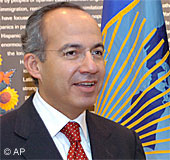 |
 |
 |
 Editorials | Opinions | December 2007 Editorials | Opinions | December 2007  
Significant Reforms Ahead For Mexico
 Oxford Analytica Oxford Analytica
go to original


| | President Felipe Calderon |
Next year may bring political consolidation for the administration of President Felipe Calderon.

Contrary to expectations, the president has governed effectively and secured approval of important reforms on taxation and public expenditure, public sector pensions and electoral issues. The first was a particular triumph, as the previous Fox administration unsuccessfully attempted it twice.

The government has been able to work with a divided Congress, particularly the center-left Institutional Revolutionary Party (PRI), and probably will continue to do so.

German Martinez on Dec. 8 was elected president of the ruling National Action Party (PAN). The previous PAN leader, Manuel Espino, clashed continuously with Calderon. Martinez is a strong ally of the president - he resigned from the cabinet to run for the leadership, to which he was elected unopposed. A smooth relationship with the PAN should allow the president to focus on negotiating with the opposition, particularly the PRI.

PRD implosion.

Divisions within the center-left Party of the Democratic Revolution will benefit the government.

De facto PRD leader, Andres Manuel Lopez Obrador, insists he was robbed of victory in the 2006 presidential election; his demand that PRD legislators vote against the government on electoral legislation, which the PRD itself was instrumental in drafting, is likely to be ignored. A new leader will be elected in March 2008, probably Jesus Ortega, rather than Lopez Obrador's candidate, Alejandro Encinas.

During 2008, divisions between those willing to work with the government (including all PRD governors outside Mexico City), and those that follow Lopez Obrador, will continue to widen, possibly causing the party to fragment. Calderon will do his best to isolate Lopez Obrador further.

The government probably will continue to combine political and legal reforms - for which securing strong support is relatively straightforward - with economic changes that require tough negotiation:

• By early 2008, approval of judicial reform is expected, which includes features such as oral trials.

• This should revive proposals former President Vicente Fox made to Congress, which legislators never considered.

Oil reform?

Calderon's most controversial reform proposals in 2008 could seek partially to open the oil sector. State oil monopoly, Pemex, needs increased investment to exploit deposits in the Gulf of Mexico. Pemex requires not only money, but also technology.

Pemex is a source of national pride; even partial privatization of the oil sector - nationalized in 1938 - is virtually unthinkable. The government probably would seek to retain control of Pemex, but allow it to negotiate contracts that share discoveries with other firms through partnerships - currently constitutionally forbidden. Even this would be challenging.

To read an extended version of this article, log on to Oxford Analytica's Web site.

Oxford Analytica is an independent strategic-consulting firm drawing on a network of more than 1,000 scholar experts at Oxford and other leading universities and research institutions around the world. For more information, please visit oxan.com. To find out how to subscribe to the firm's Daily Brief Service, click here. | 
 | |
 |



